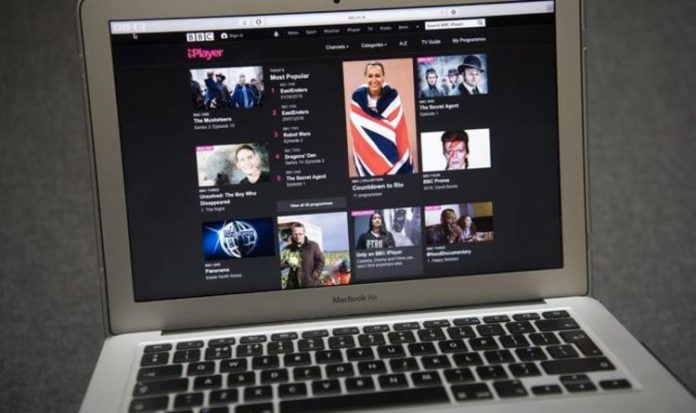BBC licence fee: Campaigner urges government to intervene
All primary and secondary schools were forced to close on January 5 after England was placed into a third national lockdown as a new covid variant had started to rapidly spread. But the BBC has been criticised for offering home school lessons online after former Spice Girl member Geri Horner, formerly known as Geri Halliwell, stepped in to help teach English. Campaign group Defund the BBC said many young children may not know who the 48-year-old pop star is.
They wrote on Twitter: “Oh yes, that academic giant, Ginger Spice.
“Splashing the cash on celebrities that kids won’t even have heard of. Typical BBC.”
The comments came after the BBC posted Ms Horner was their celebrity supply teacher yesterday.
Ms Horner then added: “There’s lots of great virtual classes on BBC to help with learning at home – my English lesson will be airing tomorrow.”
Other supply teachers have included journalist Martin Bashir, reality television star Gemma Collins and BBC European correspondent Katya Adler.

The BBC has come under fire for allowing celebrities to teach (Image: GETTY)
However today for PE they did have England and Manchester United footballer Marcus Rashford.
The BBC is offering curriculum-based TV programmes on television, the iPlayer and online, which will run alongside the BBC Bitesize collection of educational resources.
On television, there will be three hours of primary school programmes on CBBC, as well as two hours for secondary pupils on BBC Two.
Tim Davie, BBC director general, said children across the UK should have the opportunity to continue to learn the school curriculum during lockdown.
READ MORE: BBC bias: Brexiteer shames BBC over ‘bad news’ coverage

Geri Horner tweeted her delight at standing in as a supply English teacher (Image: GETTY)
He said: “Education is absolutely vital – the BBC is here to play its part and I’m delighted that we have been able to bring this to audiences so swiftly.”
Prime Minister Boris Johnson announced schools would need to offer remote learning until at least mid-February, with GCSE and A-level exams now being cancelled.
Only vulnerable children and children of key workers are allowed to attend schools for face-to-face learning.
Education Secretary Gavin Williamson said that schools were a “safe place” but the decision had been made to reduce movement within the community as a whole.
DON’T MISS
BBC on brink: Former chief admits ‘challenge to survive’ [REVEALED]
BBC faces collapse if licence fee scrapped – former chief admits [EXCLUSIVE]
‘Stop the BBC!’ BBC documentary accused of putting puppies at risk [VIDEO]
BBC licence fee: ‘They had five years to prepare’ fumes Gullis
He told an education select committee today that data showed only 14 percent of children had been in schools on Monday, which had had an “immediate impact overall” on transmission.
Susan Acland-Hood, DfE permanent secretary, said that collections of this data were made daily.
She said: “The picture is that 14 percent of the overall cohort were in school on Monday but we collect it every day.
“You may be hearing that there is quite a different picture for primary and secondary schools.

The BBC has been criticised for offering home school lessons online with celebrities (Image: GETTY)
“Within that 14 percent average attendance in primary schools is closer to 20 percent and attendance in secondary schools averages closer to 4 percent.”
Mr Williamson added he would “make no apology” for pushing to have all those who worked in schools prioritised for vaccination.
He said: “There’s a school workforce of a million and it is absolutely vital that we do not forget support staff in this because it is often the support staff that are the most exposed.
“I think there is a special need in the area of special schools as well where there is often a crossover between not just an education setting but also as a care and health setting as well.
“It is quite understandably right that the Government has chosen to prioritise those that are most at risk of being hospitalised (for vaccination).
“But … in that next wave where we have to prioritise others, I will make no apology for the fact that I see the top priority as all those who work in schools.

The BBC is offering curriculum-based TV programmes on television, the iPlayer and online (Image: GETTY)
“Not just teachers but all those that work in schools because every single one of them is absolutely vital for delivering education.”
A spokesperson for BBC told Express.co.uk: “Education experts were involved in the making of Celebrity Supply Teacher and as a very successful children’s author, Geri is an ideal choice to deliver a lesson on creative writing.
“We’re incredibly proud that our Lockdown Learning offer is fun, entertaining and educational and is being used by millions of families across the UK.”
On the first day, Lockdown Learning on CBBC saw the slot average, from 9am-noon, rise by 436 percent while BBC Two saw an increase of 29 percent from 1pm to 3pm compared to their slot averages of each Monday over the last 52 weeks.







